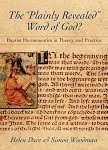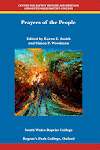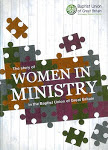Psalm 19.1-6,14
Acts 13.1-3; 14.8-18
Last week, our post-Easter journey
through the formative years of the early Christian community
took us to that pivotal moment of Peter’s vision of unclean animals,
the divine command to kill and eat,
and his realisation that what God has declared clean,
humans should not declare unclean.
The outworking of this was, as we saw,
that the boundaries around the community of faith were blown apart.
No longer was God the holy prerogative of one group of people,
but rather the good news of God made known in Jesus
was for all people, without distinction.
And so, at the end of our story from last week,
Peter baptised Cornelius the God-fearing Centurion, along with all his family.
A happy ending for all:
and thus the Gospel went to the Gentiles.
Except, this was actually only the first act of a much longer drama…
because although Cornelius was a Gentile,
he was also the proverbial thin-end-of-the-wedge.
You see, he was already a God-fearer,
he was already keeping the ten commandments,
and observing the requirements of the Jewish law
to keep himself and his family ritually pure.
Cornelius may have been un-pure to Peter,
until his vision convinced him otherwise,
but there was much more inclusion still to come.
In fact, the issue of how much of the Jewish Law
gentiles were to be required to keep if they became Jesus-followers
would dominate the early decades of Christianity,
with Peter and Paul having a significant falling out over it,
before reaching a compromise solution.
You see, whilst Peter took the message of Jesus to Cornelius,
Paul was taking it into places Peter hadn’t even imagined.
And this is what we see going on here
in our reading today from the book of Acts,
when we meet Paul and Barnabas embarking
on what becomes known as Paul’s First Missionary Journey.
It’s the late 40s, so about 15-20 years after the time of Jesus,
and they set off from Syrian Antioch on the Eastern Mediterranean,
journeyed by boat to Cyprus,
then again to the southern coast of Turkey,
before heading inland to end up in the region
of the two cities of Lystra and Derbe.
Just as an aside here,
the distances that Paul and his colleagues covered
on his various missionary endeavours is immense.
A few years ago, Liz and I visited Turkey
to visit biblical sites in the area around Ephesus,
and we would drive for two or three hours on a fast motorway,
in 40 degree heat, to get from one place to another.
It is quite astonishing to think of Paul
doing these trips overland on foot or by horseback.
But anyway, back to our story.
Lystra was a Roman colony,
and although people in the countryside around it
would have spoken the local dialect as well as ancient Greek,
(the language of the New Testament );
archaeological evidence suggests that in the city itself,
the dominant language for at least official inscriptions was Latin.
This was a thoroughly Romanised city.
What this meant was that, as far as we know,
when Paul and Barnabas visited Lystra
they were encountering people
who had no background knowledge of Judaism at all.
This was not a crowd of God-fearing centurions
desperate to convert,
it was a crowd well-versed in the Graeco-Roman pantheon,
with no knowledge of Israel’s God at all.
And so, Paul went to the open space in the town,
the first century Roman equivalent of Speakers’ Corner,
and started to tell people
that the living God could be encountered
through the Spirit of God’s son Jesus
who had been killed and yet was alive.
For the crowd in Lystra this was a new story.
He wasn’t trying to convince them
that Jesus was their long-awaited Messiah,
as he did when speaking with a Jewish audience;
and unlike Peter with Cornelius,
he had no shared knowledge of the Hebrew Bible to fall back on.
This was evangelism from first principles,
trying to explain the good news of Jesus
to people who didn’t even know who God was!
Of course, they knew who the gods were
– the Greek and Roman gods at least –
but they didn’t know who the one God was,
the God who had been revealed to Abraham, Isaac, and Jacob,
to Moses and the Prophets,
and to their spiritual descendants down to Jesus
and then on to Paul himself.
And so Paul speaks about God,
and one man who had been lame from birth was listening,
and he found the capacity to make the leap of faith, and was healed.
It is surely not insignificant that the outcast, the beggar at the gate,
was the first person in that city to have an experience of faith.
As is so often the case with miracles in the New Testament,
the result of his healing
was that his exclusion from society was removed.
No longer would he have to sit and beg, unable to work.
His encounter with the good news of Christ restored him,
removed the cause of his shame,
and lifted him up, literally, to his feet
to take his place alongside the other citizens of the city.
I wonder if we might ponder for a moment
who, in our world, are the excluded,
who are cast down, and unable to take their full place in society?
And I wonder if we might consider the structures and systems
that are at work in our world
to keep these people bowed down to the ground?
I’m thinking, as we explored last week,
of the racism that still runs through Western society;
and I’m thinking of the homophobia
that still strikes deep into our church communities.
These exclusions of people based on their God-given identity
run contrary to Peter’s revelation
that no person whom God has declared clean
should ever be called unclean.
But I’m also thinking of the structures of inadequately regulated capitalism,
where workers are exploited, where people are commodified,
and where who your parents were and where you were born
still profoundly affects your ability to live a good and healthy life.
What, I wonder, would it be
for us to do to people in our world
what Paul did in Lystra,
to look at them intently, to really see them,
to see those whom others ignore,
and to say to them, ‘Stand upright on your feet’.
Sometimes, there is a mindset amongst some Christians
that social justice is some kind of distraction from preaching the gospel;
that taking concrete and practical action in the world
to address the injustices of people’s lives
is in some way not missional.
Well, in response, I say, ‘Tell that to Paul!’
When he found himself in a city
where no-one spoke the language of faith,
where the only gods being worshipped
were the gods of fear, exploitation and domination,
his first missional activity
was to raise a broken man to his feet.
And I believe we should be doing the same.
This is why we are involved with London Citizens,
taking action with others to bring about justice
for some of the most broken and bowed down people in our city,
people whose circumstances of birth
have dictated their lack of opportunity to flourish and stand tall.
Through our partnerships with London Citizens,
we lift them to their feet, we help them stand tall,
and we do so because we see them, and we choose to stand with them,
and we do this because we believe
that God loves all people, without exception.
Sometimes I hear people bemoaning the fact
that we no longer live in a Christian country;
upset that people don’t know the name of Jesus except as a swear word;
at a loss to communicate the wonderful gospel
of the good news we have received,
because those beyond the church
no longer speak the language of faith in the way they once did.
Well, as Francis of Assisi may not have actually said,
‘Preach the Gospel at all times. Use words if necessary.’
Or, perhaps to put it around the other way:
‘When words fail, preach through deeds’.
Action to address the injustices of society is a gospel imperative,
and Paul knew this well, as we see in our reading today.
But the people weren’t yet hearing him clearly.
They saw the transformation in the life of the man,
but they didn’t yet have a framework of faith
to understand what they have just seen.
The only matrix they had for this kind of conversion in a person’s life
was that of their existing religions,
and so they proclaimed that the gods had come down to them in human form,
and started to worship Paul and Barnabas as Zeus and Hermes.
And then it escalated as the local priest of Zeus
came from his nearby temple with some oxen to offer as a sacrifice.
Let’s think about this for a moment:
the only matrix through which the locals knew how to respond
to a work of divine liberation,
was one which required an act of sacrifice by humans in response.
And there is something deeply human
about this desire to sacrifice something to the gods
in exchange for divine favour,
or in payment for blessings received.
In our interpersonal relationships with one another,
we are hardwired to a transactional understanding of what it means to relate.
If someone comes to dinner at your home, they will bring a gift
– a token offering to express their gratitude for your hospitality.
If someone gives you a gift with no reason,
maybe just because they thought you’d like it,
the chances are you’ll reply,
‘Oh, that’s so kind, I’m sorry I don’t have a gift to give you back’.
We are not used to receiving without expense.
At a commercial level, the transactions are more quantified:
we know what work is expected of us,
and what we will receive in remuneration,
but there is still an expectation of giving something up
in order to receive something back,
whether that is time, or effort, or money…
And humans have been writing this transactional system
into their theology since time immemorial.
Most ancient religions included some aspect of sacrifice in exchange for blessing.
What was unusual about Christianity
was the conviction that this sacrificial system had come to an end.
The once-for-all sacrifice of Jesus,
the sinless one who died to unmask and expose
the forces of evil that keep people trapped in cycles of sacrifice,
is a central message of Christianity.
And so Paul and Barnabas are quick to resist the offer
of the locals in Lystra to hail them as gods and offer sacrifices to them.
This then opens up their moment to preach,
to turn deeds into words,
to teach those who lacked the appropriate grammar of faith
the new language that would help them give shape
to belief based on grace and not demand,
on free gift rather than transaction.
When I was preparing this sermon,
I was discussing it with Dawn, and she told me a story.
There was once a village, and their local priest every day came and took a chicken to sacrifice to the local gods, to keep them happy.
But the village had a problem, they were running out of food and the people were hungry.
They turned to their priest who said that the gods were angry and punishing them with hunger, and required more sacrifice. So, they sacrificed two of their precious chickens that day.
But still they were hungry, so they sacrificed three chickens the next day. Yet still they were hungry.
And then a prophet arrived, and proclaimed that it was the will of the high God that they should sacrifice no more chickens.
And soon the people were no longer hungry.
The problem with sacrificial systems
is that they demand more and ever more to sustain themselves.
From grain, to animals, to money, to time,
and yes eventually to human lives.
We literally sacrifice people on the altars of our gods,
and if you think we don’t, just go and walk around the West End
and see the broken lives of the people begging on the streets,
most of whom are the victims of people trafficking,
being exploited unto death to fund the organised crime syndicates
that supply this city’s insatiable demand for illegal drugs.
This is why we need the good news of a God who says,
‘The sacrificing stops here!’
This is why we need the good news of a God
who sees the outcast, the vulnerable, and the exploited,
and declares them pure and holy,
raising them up and setting them on their feet.
This is a gospel message for our time,
every bit as much as it was for the Pagans of Lystra.
And so, having demonstrated God’s concern for the broken,
and having challenged the culture of transactional sacrifice,
Paul then, and only then, attempts to frame his faith in words.
And he does so by using what theologians these days
would call ‘natural theology’.
This is the attempt to establish religious truths by rational argument,
without reliance on revelation.
So Paul points them to nature,
saying that the witness to the goodness of God
is to be found through observing
the heavens, the earth, the sea and all that is in them,
in the rains from heaven and the fruitful seasons,
in good food to eat and in hearts full of joy (14.15-17).
If Peter has established that God is already at work
in the world beyond Israel,
Paul here takes this to the next level:
God is woven in and through creation,
and can be known through our experience
of the goodness of the world around us.
The place Paul goes to establish common ground,
a common grammar of faith, with the Pagans of Lystra,
is to go back beyond the prophets, beyond Moses,
beyond Abraham, Isaac, and Jacob,
to the goodness of the created world itself.
And in our world,
where people no longer share the grammar of faith with faithful Christians,
where our words and our proclamations fall on ears that are deaf
not because they cannot hear us, but because they cannot understand us,
I wonder if we need to put our faith
in the truth that actions can speak louder than words.
From works of justice,
to a passionate commitment to creation-care and environmental responsibility,
if we are not walking the talk,
we are not preaching a message that deserves being heard.
The God we worship,
who calls us to follow by the example of Jesus,
and who inspires our hearts by the Spirit,
is the God of the poor, the vulnerable, the exploited, and the broken.
But God is also the God of the cosmos,
whose being is interwoven through all things,
who is known in nature, experienced through science,
and worshipped through mystical encounter.
As Graham Harvey says,
‘the world is full of persons, only some of whom are human, and life is always lived in relationship with others… All that exists lives… all that lives is holy”
https://www.christiananimism.com/
Noel Moules agrees, suggesting that,
‘everything that exists is both alive and sacred, with all things being interconnected and related: that the earth, along with each animal, plant, inert object and natural phenomena are persons (or potentially so); a community of creation requiring harmonious relationships between humans, their ancestors and wild nature, nurtured by respectful and sustainable life ways’
https://www.christiananimism.com/
Or, as the Psalmist put it,
The heavens declare the glory of God;
the skies proclaim the work of God’s hands.
Day after day they pour forth speech;
night after night they display knowledge.
There is no speech or language where their voice is not heard. (Ps 19.1-3, NIV)
This is our faith, these are the words of our faith,
and our calling is to proclaim the good news of God
who is, as Paul put it in his letter to the church in Ephesus,
‘one God and Parent of all,
who is above all and through all and in all.’ (Eph.4.6).














